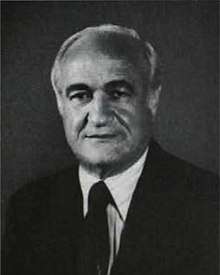Joseph A. Bevilacqua Sr.
Joseph Anthony Bevilacqua Sr. (December 1, 1918 – June 21, 1989) was Chief Justice of the Rhode Island Supreme Court from 1976 through 1986. His career was tarnished due to his association with organized crime.
Joseph A. Bevilacqua | |
|---|---|
 | |
| 37th Chief Justice of the Rhode Island Supreme Court | |
| In office January 26, 1976 – May 28, 1986 | |
| Preceded by | Thomas H. Roberts |
| Succeeded by | Thomas F. Fay |
| 215th Speaker of the Rhode Island House of Representatives | |
| In office January 7, 1969 – January 26, 1976 | |
| Preceded by | John J. Wrenn |
| Succeeded by | John J. Skiffington Jr. |
| Member of the Rhode Island House of Representatives | |
| In office January 4, 1955 – January 26, 1976 | |
| Preceded by | Alfred P. Perrotti |
| Succeeded by | Frank J. Fiorenzano |
| Constituency | 16th Providence district (1955–67) 13th district (1967–76) |
| Personal details | |
| Born | Joseph Anthony Bevilacqua December 1, 1918 Providence, Rhode Island |
| Died | June 21, 1989 (aged 70) Boston, Massachusetts |
| Political party | Democratic |
| Spouse(s) | Josephine Amato |
| Alma mater | Providence College (BA) Georgetown University (JD) |
| Signature | |
| Military service | |
| Allegiance | |
| Branch/service | United States Army |
| Years of service | 1941–1946 |
| Rank | First lieutenant |
| Battles/wars | World War II |
| Awards | |
Early life and career
Bevilacqua grew up in Silver Lake, an Italian-American neighborhood of Providence.[1] He attended Providence public schools and received a Bachelor of Arts from Providence College in 1940.[2][3] He served in the Army from 1941 to 1946, achieving the rank of First Lieutenant and serving in the Italian Campaign (World War II) where he was wounded and received a Purple Heart.[3] He received a Juris Doctor degree from Georgetown Law School in 1948,[3] and his clients and friends included organized crime figures.[4]
Political career
Bevilacqua was elected to the Rhode Island House in 1954;[5] he became majority leader in 1966 and Speaker in 1969.[5] He worked for the passage of the state's medicare statute and for job retraining measures.[2] He was elected by the General Assembly as Chief Justice of the State Supreme Court in 1976,[5] and he promised to put aside "old friendships and causes."[4] Privately, however, he reassured mobster Nicholas Bianco: "Don't worry, I'll still keep my connections."[1]
Around this time, a number of allegations surfaced regarding Bevilacqua's ties to organized crime. The New York Times stated that allegations had been made in 1976 that he had harbored a fugitive from a 1963 department store robbery, and had accepted a payment of $2,000 from him.[5] It also became public that he had written a letter to the State Parole Board in 1973 vouching for the integrity of crime boss Raymond L. S. Patriarca.[1][5] The letter read, "To whom it may concern: I have known Mr. Patriarca for a good many years. I have found him to be a good person of integrity and, in my opinion, good moral character."[1] Bevilacqua officiated at the wedding of Patriarca's chauffeur, who was under indictment for fraud.[5] The State Commission on Judicial Tenure and Discipline investigated these incidents and took no action.[5]
Impeachment and resignation
The Providence Journal brought public attention to Bevilacqua's ties to organized crime figures in 1984.[5] State police officers followed him as he visited the homes of crime figures,[5] and he was also observed frequenting a mob-connected motel for mid-day trysts with women.[5] The Journal ran a front-page photo of him zipping his pants fly while leaving the Alpine Motel in Smithfield, Rhode Island.[1]
A judicial commission headed by former Supreme Court Justice Arthur Goldberg censured Bevilacqua for associating with criminals.[5] The General Assembly began impeachment proceedings in 1986, the first such proceedings in the state's history,[1] but Bevilacqua resigned during the proceedings.[5][1]
Death
Bevilacqua was hospitalized several times in his last few months, including for a heart attack in early May 1989.[4][5] He was taken to Brigham and Women's Hospital on May 30, 1989 and died there on June 21.[4][5] He is buried in Saint Ann Cemetery in Cranston, Rhode Island.
References
- Reynolds, Mark (12 March 2017). "'Crimetown' Episode 12: R.I. chief justice kept close ties to mob friends". The Providence Journal. Retrieved 14 March 2017.
- Joseph M. Muratore, Italian-Americans in Rhode Island, Volume 2 (1999), p. 92.
- Manual with Rules and Orders for the Use of the General Assembly of the State of Rhode Island and Providence Plantations (1975), p. 237.
- "Joseph Bevilacqua; Judge Tied to Rhode Island Mob". The Los Angeles Times. 22 June 1989. Retrieved 14 March 2017.
- "Joseph A. Bevilacqua Dies at 70; Rhode Island Judge Linked to Mob". The New York Times. 22 June 1989. Retrieved 14 March 2017.